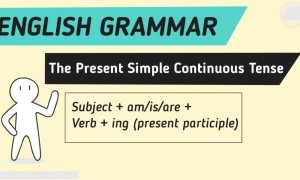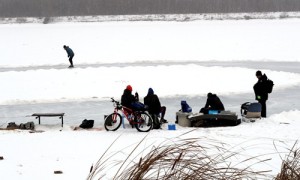听从 listen to
(X) Jennie is so stubborn that she won’t hear you.
大家注意听好了! hear 跟 listen 都是「听」的意思,那两者到底有什么差别? hear 是通常是指「不经意地听到」,是毫无准备的状况下听见的,但是 listen 则是主动地「集中注意、专心地听」。 「听从」为主动行为,所以此状况下要用 listen 才正确!
Don’t listen to him. You don’t look fat in that dress!
别听他的,妳穿这件裙子并不胖。
Captain: I can’t hear you!
Kids: Aye aye, captain!
船长:太小声啰,我听不见!
小孩:是的,船长!
Jill: Did you hear that? Jennie is thinking of moving to Bogato.
Jill: 你有听到吗? Jennie 在考虑搬去波哥大。
Judy: I lived there for three years, but I wouldn’t recommend it. Maybe I should speak to her first.
Judy: 我在那住过三年,不建议搬去那。或许我应该先跟她聊聊。
Jill: I wouldn’t waste your time.
Jill: 是我的话我不会浪费时间。
Judy: Why?
Judy: 为什么?
Jill: Jennie is so stubborn, she won’t listen to you, even if you do have first-hand experience of living there.
Jill: Jennie 很固执,她不会听你的话的,即使你有在那住过的一首经验也一样。
有________ There is ________.
(X) There has ________.
have 跟 has 在中文常常翻译成「有」,例如:I have a question. (我有一个问题) ,此句话的 have 做一般动词使用,但在表达「(这里/那里)存在有… 」的时候,则要用 There is/are… 的固定句型,另外如果要表示「这里或那里有…」可以在整句话最后加上地方副词变成 There is/are…here/there. 。
I have a pen. I have an apple.
我有一支笔,我有一颗苹果。
There is a strange man singing as he holds a pen and an apple.
有一个奇怪的男人拿着一支笔和一颗苹果在唱歌。
Sam: Do you know where I can get my computer repaired?
Sam: 你知道哪里可以修电脑吗?
Tom: There is a specialist mall near here.
Tom: 这附近有个专门的商场。
Sam: Do you know how to get there?
Sam: 你知道怎么去吗?
Tom: There is a subway station right next to it, but it doesn’t take long to walk.
Tom: 旁边就有个捷运站,但用走的也不会太远。
Sam: It’s a nice day; let’s just walk.
Sam: 今天天气很好,就用走的吧。
机会很大 (The) chances are high that ________. / There is a good chance that ________.
(X) chances are big
中文里我们说的「大」相对英文就是 big ,但是为什么「机会很大」不是用 big 而是用 high (高) 呢? chance 这个字除了有「机会」的意思,也可以翻作「可能性」,如果是可能性的话,那用 high 这个字来形容,听起来就没错了吧!或是我们也可以说 There is a good chance that… 的句型表达同样意思喔。

The chances are high that she likes you back. Just go over there and ask her out.
她也喜欢你的可能性很高,快过去约她出去。
There is a good chance that Clark Kent and Superman are one and the same. There is no way they would have had the same haircut at the same time.
Clark Kent 就是超人的机会很大,他们怎么可能同时剪同一个发型。
Celine: There’s a good chance we’re going to be stuck here because of the snowstorm …
Celine: 我们很有可能因为暴风选会被困在这…
Andy: What’s the earliest flight we can get if this one is cancelled?
Andy: 如果班机被取消的话最早的班机是哪班?
Celine: We’ll probably have to wait another two days.
Celine: 有可能要再等两天。
Andy: This will give us a chance to go to that theme park.
Andy: 这样我们就有机会可以去那个主题公园。
Celine: The chances are high that that will also be closed because of the weather. What about going to the history museum?
Celine: 因为天气那里也有可能会关闭。去历史博物馆如何?
差点忘记 I almost forgot.
(X) I almost forget.
「差点忘记」是在说一件在过去差点发生的事情,但说话的当下已经想起来了,既然已经是过去,便要用过去式 forgot ,如果说 I almost (always) forget. 的话,则代表一件事情习惯性一直被忘记,看看以下例子就可以知道差别了。
I almost forgot Mel’s birthday yesterday. Can you imagine if I did forget? She would be so upset.
我昨天差点忘记 Mel 的生日了,你能想像如果我真的忘记了吗?她一定会超难过。
I almost always forget to write my name down when I take exams.
我每次考试的时候都会差点忘记要写自己的名字在考卷上。
Dave: I almost forgot Mother’s Day.
Dave: 我差点忘了母亲节。
Steve: How come?
Steve: 怎么会?
Dave: Because it’s on a different day in my country.
Dave: 因为在我的国家母亲节是另外一天。
Steve: Ah I see. So you didn’t see all the Mother’s Day gifts in the shops to remind you?
Steve: 我懂了,所以你看到店里那些母亲节礼物没有让你想起来?
Dave: Exactly. Luckily my sister reminded me a couple of days before.
Dave: 没错,幸好我姊前几天有提醒我。
把钱存进银行 I have to deposit my money into my bank account. / I have to deposit my money in the bank.
(X) I have to save money in the bank.
save 的意思是「保存,储存;储蓄,存钱」,但 save money 的「存钱」是指「积蓄」的意思,也可以指「省钱」,但把钱存进银行则是另外一回事,此时要用 deposit ,意指「(在银行或保险箱中) 存放,储存 (金钱)」,下次去银行时不要再说错了唷!
I’ve been saving money to buy a new car. That’s why I can’t go to that fancy restaurant with you.
我在存钱准备买新车,这就是为什么我不能跟你一起去吃那家高级餐厅。
You really should deposit your money in the bank. It’s dangerous for you to hold on to so much cash.
你应该要把你的钱存进银行,你这样拿着一大把的现金很危险。
Tara: I just got paid in cash, so I need to go and deposit the money into my bank account before we get coffee.
Tara: 我刚刚拿到现金薪水了,所以去买咖啡之前我要先去银行一趟把钱存起来。
Ringo: My brother refuses to deposit money in the bank. Ringo: 我哥都不把钱存在银行。
Tara: Why is that?
Tara: 为什么?
Ringo: He says he thinks the banks are trying to steal from him.
Ringo: 他说他觉得银行会偷他钱。
Tara: Where does he keep his money then?
Tara: 那他的钱都存在哪?
Ringo: In a shoebox hidden under his bed.
Ringo: 在他床底下的一个鞋盒。
因为________,所以_________。 Because (of) ________, ________. / ________, so ________.
(X) Because (of) ________, so ________.
中文可以说「因为… ,所以… 」,但在英文中, because 跟 so 不能在同一句话里出现,这是因为 because 和 so 都是连接词,有连接词的子句称「附属子句」,而没有连接词的子句叫「主要子句」,附属子句必然就是要成为主要子句的附属,如果 because 跟 so 放在同一句话里面,那就会有两句附属子句,而少了主要子句了,同样道理,although (虽然) 和 but (但是) 也不能放在一起,记住啰!
Because of my allergy to green foods, I can’t eat any vegetables.
因为我对绿色食物的过敏症状,我不能吃任何蔬菜。
Jay: I was supposed to go abroad for my birthday, but I couldn’t because of the pandemic.
Jay: 我生日应该要出国玩的,但因为疫情的关系所以无法。
Chris: That’s a shame. Wereyou going to go with your friends?
Chris: 真可惜,你本来要跟朋友去的吗?
Jay: Yeah. We still wanted to go somewhere though, so we decided to go on a camping trip here.
Jay: 是啊,我们原本还是想去哪走走,所以后来就决定去露营。
Chris: Nice, at least you still got a chance to escape the city.
Chris: 很棒,至少你们还有机会逃离城市的喧嚣。
Jay: Yeah, it’s good to get out in nature every once in a while.
Jay: 是啊,偶尔去接触大自然还不错。
Although I’m allergic to green foods, green candy is an exception.
虽然我对绿色食物过敏,但绿色的糖果是例外。
挂了/没电了 It’s dead. / It died.
(X) It’s die.
die 是非延续性动词,所以如果表达某个生物已经死了,记得要用过去式 died,而 dead 则是形容词,形容已经死亡的状态。补充一下 one’s phone died 或 one’s phone is dead 都是指手机没电了或手机已经坏了,很实用吧!
A: What happened to the goldfish that I gave you?
B: Well, it died the moment you left the house.
A: How about the turtle?
B: It’s dead, too.
A: 我给你的金鱼怎么了?
B: 呃…你一踏出门它就死了。
A: 那乌龟呢?
B: 它也死了。
Can I borrow your phone to call my mom? My phone is dead.
我可以跟你借手机打给我妈吗?我的手机没电了。
Sam: Can you send a message to Bonnie saying we’re on our way?
Sam: 你可以传讯息跟 Bonnie 说我们在路上了吗?
Michel: Is there something wrong with your phone?
Michel: 你的手机是不是有问题?
Sam: The battery is dead.
Sam: 电池坏了。
Michel: Can’t you use that charging bank I got you for your birthday?
Michel: 你就不能用你生日我送你的行动电源吗?
Sam: Unfortunately that also died a few weeks ago.
Sam: 很不幸的是几个星期前它也挂了。







